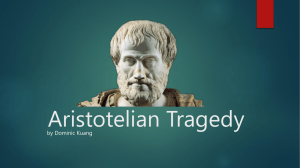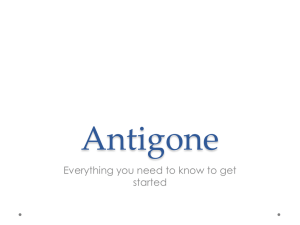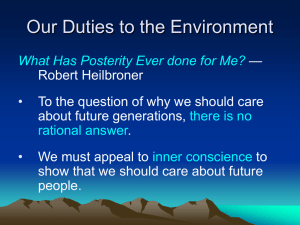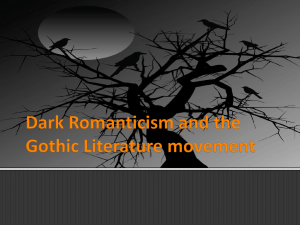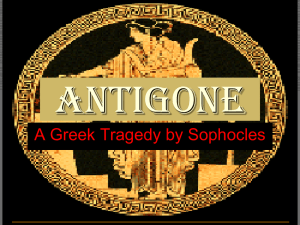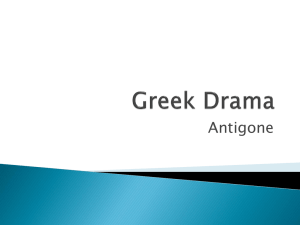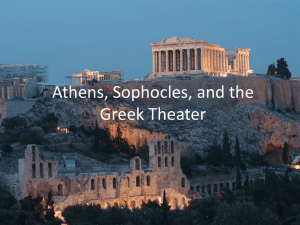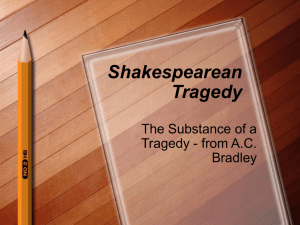Reading a Play
advertisement
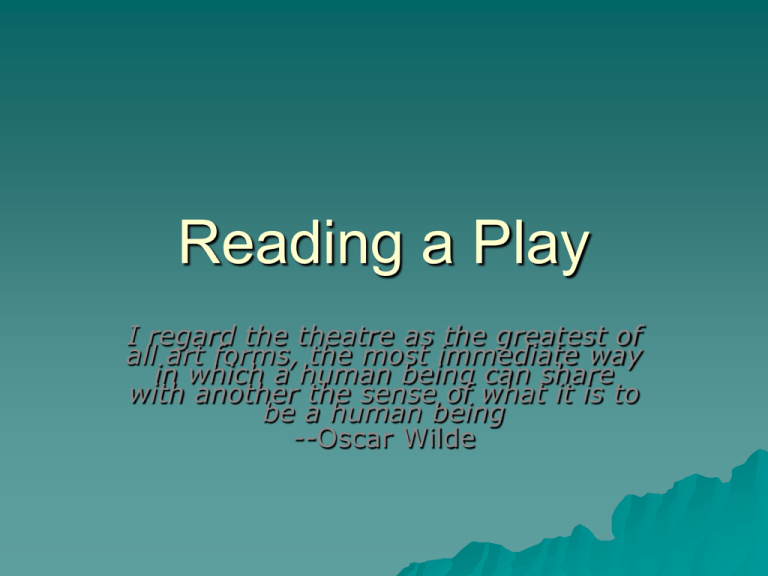
Reading a Play I regard the theatre as the greatest of all art forms, the most immediate way in which a human being can share with another the sense of what it is to be a human being --Oscar Wilde Purpose Most plays are written not to be read in books but to be performed. However, there are advantages to reading plays in books. – It is better to know some masterpieces by reading them than to never know them at all. – It would be next to impossible to see every Shakespearean play on stage, but the plays are easily accessible on paper. Advantages A play is literature before it comes alive in a theater. If a play contains difficult language and allusion, reading it enables us to study it at our leisure and return to parts that demand greater scrutiny. Some plays are actually destined to be read more often than they are acted. Advantages Sometimes reading a play is the only way of knowing it as the author wrote it in its entirety. Producers of plays often leave out important speeches and scenes in plays, and the production itself is often representative of the producer’s interpretation of the play, which may be different from the way that one perceives it while reading. The Elements The protagonist The antagonist The exposition The climax The resolution Stage directions Tragedy Tragedy: a play that portrays a serious conflict between human beings and some superior, overwhelming force. It ends sorrowfully and disastrously, and this outcome seems inevitable. The art of tragedy goes back to ancient Athens, where Greek dramatists Sophocles, Aeschylus, and Euripides wrote plays. Tragedy Tragedy is fairly simple: – The protagonist undergoes a reversal of fortune, from good to bad, ending in catastrophe. – However, tragedies can be tough to interpret as many readers will have very different opinions about the text. – Even though the formula for tragedy is simple, most tragedies will somehow fail to observe the “conventions” of tragedy. Real Life Tragedy vs. Literary Tragedy Real life: – The death of a child – A fire that destroys a family’s house – The killing of a bystander caught in the crossfire of a shootout between criminals. What do these all have in common? – They involve the infliction of great and irreversible suffering. – The sufferers are innocent, and they have done nothing to cause or deserve their fate. Real Life Tragedy vs. Literary Tragedy Literary Tragedy: – The protagonist’s reversal of fortune is brought about through some error or weakness on his part, generally referred to as his tragic flaw. – Despite this weakness, the hero is traditionally a person of nobility, of both social rank and personality. – In most tragedies, the catastrophe entails not only the loss of outward fortune—things such as reputation, power, and life itself, but also the erosion of the protagonist’s moral character and greatness of spirit. Style Tragedies are customarily written in an elevated style, one characterized by dignity and seriousness. In the Middle Ages, the word tragedy indicated a work written in a high style in which the central character went from good fortune to bad. Comedy indicated the opposite. How Tragedies Make the Reader Feel According to Aristotle, tragedies seek to arouse pity and fear in the reader. We feel sorry for those who appear to be worse off than ourselves. Even if a tragedy “moves” you, you will most likely feel a sense of detachment from the protagonist: a “better him than me” attitude. There is also the element of fear: readers are made to feel vulnerable in the face of life’s dangers and instability. The Theater of Sophocles For the citizens of Athens in the fifth century B.C. theater was both a religious and a civic occasion. Plays were presented twice a year at religious festivals—both associated with Dionysius, the god of wine and crops. In January there was the Lenaea, the festival of the winepress, when plays, especially comedies were performed. The major theatrical event of the year came in March at the Great Dionysia, a city-wide celebration that included sacrifices, prize ceremonies, and spectacular processions as well as three days of drama. The Theater of Sophocles Each day at dawn a different author presented a trilogy of tragic plays— three interrelated dramas that portrayed an important mythic or legendary event. Each intense tragic trilogy was followed by a satyr play, an obscene parody of a mythic story, performed with the chorus dressed as satyrs, unruly mythic attendants of Dionysius who were half goat or horse and half human. The Theater of Sophocles The Greeks loved competition and believed it fostered excellence. Even the theater was a competitive event—not unlike the Olympic games. A panel of 5 judges voted each year at the Great Dionysia for the best dramatic presentation, and a substantial cash prize was given to the winning poet-playwright. The Theater of Sophocles Sophocles triumphed in the competition twenty-four times, but did not win a prize for Oedipus the King. Although this play ultimately proved to be the most celebrated Greek tragedy ever written, it lost the award to a revival of a popular trilogy by Aeschylus, who had recently died. The Theater of Sophocles: Staging As many as 17,000 spectators could fit into the open air hillside amphitheater. The audience was arranged in rows, with the Athenian governing council and young military cadets seated in the middle sections. Priests, priestesses, and foreign dignitaries were given special places of honor in the front rows. The Theater of Sophocles: Staging The performance space they watched was divided into two parts: the orchestra, a level circular “dancing space”, and a slightly raised stage built in front of the skene or stage house, originally a canvas or wooden hut for costume changes. The Theater of Sophocles: Staging The actors spoke and performed on the stage The chorus sang and danced in the orchestra The skene served as a general set or backdrop The Structure No more than 3 actors were allowed on stage at any one time The chorus had to have 15 members The actors’ spoken monologue and dialogue alternated with the chorus’ singing and dancing Each tragedy began with a prologue The parados came next (the song for the entrance of the chorus) The Structure The next action was enacted in episodes, like the acts or scenes in modern plays The episodes were separated by danced choral songs or odes The play ended with the exodos, or closing, in which the characters and chorus concluded the action and departed The Actors The actors wore masks Some of these masks had exaggerated mouthpieces, possibly designed to project speech across the open air. The masks helped spectators far away recognize the chief characters. The Masks The masks often represented certain conventional types of characters: the old king, the young soldier, the shepherd, the beautiful girl (women’s parts were played by male actors) The actors also began to wear cothurni, high, thick-soled elevator shoes that made them appear taller than ordinary men. The Civic Role Athenian drama was supported and financed by the state. Administration of the Great Dionysia fell to the head civil magistrate. He annually appointed three wealthy citizens to serve as choregoi, or producers, for the competing plays. The Civic Role Each producer had to equip the chorus and rent the rehearsal space in which the poet-playwright would prepare the new work for the festival. The state covered the expenses of the theater, actors, and prizes. Theater tickets were distributed free to citizens, which meant that every registered Athenian, even the poorest, could participate. The Civic Role The playwrights addressed themselves to every element of the Athenian democracy. Only the size of the amphitheater limited the attendance. It could hold slightly less than half of the population of Athens. The Civic Role Greek theater was directed at the moral and political education of the community. The poet’s role was the improvement of the polis or city-state. The purpose of the tragedies was for the performers and the audience to put themselves in the places of persons quite unlike themselves, in situations that might engulf any unlucky citizen—war, political upheaval, betrayal, domestic crisis. The Civic Role The release of the powerful emotions of pity and fear created a sort of paradox—how a viewer takes aesthetic pleasure in witnessing the suffering of others. Aristotle’s Concept of Tragedy Aristotle defined tragedy in the fourth century B.C. He didn’t make the definition to “lay down the laws” for what tragedy should be. More likely, he drew from tragedies that he saw or read and gave a general description of them. Aristotle’s Concept of Tragedy The protagonist is a person of “high estate”, such as a king or queen or other member of a royal family. The protagonist must fall from power and from happiness; his high estate gives him a place of dignity to fall from and perhaps makes his fall seem all the more a calamity in that it involves an entire nation or people. Aristotle’s Concept of Tragedy The protagonist is not only extraordinary because of his position in society: Oedipus is not only a king but also a noble soul who suffers profoundly and who employs splendid speech to express his suffering. Aristotle’s Concept of Tragedy The tragic hero is not a superman; he is fallible. The hero’s downfall is the result of his own error or transgression, or what’s called his “tragic flaw.” Often, the tragic flaw will be extreme pride, leading to overconfidence. Aristotle’s Concept of Tragedy Aristotle implies that after witnessing a tragedy we feel better, not worse— not depressed, but somehow elated. We take a kind of pleasure in the spectacle of a noble man being abased. Part of this pleasure may be based in our feeling of “rightness” or accuracy of what we have just witnessed. Aristotle’s Concept of Tragedy Recognition: the revelation of some fact not known before or some person’s true identity. Tragedy is about the realization of the unthinkable. Reversal: action that turns out to have the opposite effect from the one its doer had intended. Aristotle’s Concept of Tragedy The play usually ends with the protagonist accepting his fate as the divine will of the gods. The protagonist has fallen from high estate but is uplifted in moral dignity. End

